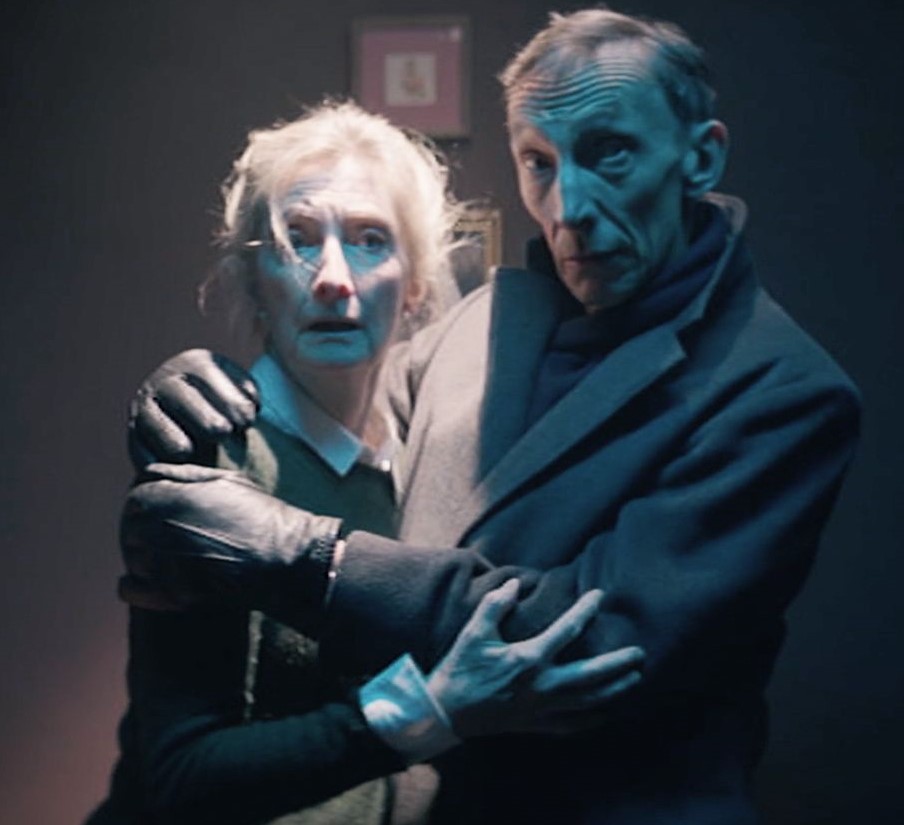
 First-time feature director Justin G. Dyck plays a delightfully nasty trick on the audience in his debut film, Anything for Jackson. The first act sets us up for something of a dark comedy that follows Audrey and Henry Walsh (Sheila McCarthy and Julian Richings), a well-off, elderly couple (and recent Satanic converts) who we meet as they’re kidnapping a young pregnant patient of Henry’s named Becker (Konstantina Mantelos). You see, they’d recently lost their beloved grandson Jackson in a car accident, and they intend to perform a reverse exorcism to embody his soul in Becker’s unborn child.
First-time feature director Justin G. Dyck plays a delightfully nasty trick on the audience in his debut film, Anything for Jackson. The first act sets us up for something of a dark comedy that follows Audrey and Henry Walsh (Sheila McCarthy and Julian Richings), a well-off, elderly couple (and recent Satanic converts) who we meet as they’re kidnapping a young pregnant patient of Henry’s named Becker (Konstantina Mantelos). You see, they’d recently lost their beloved grandson Jackson in a car accident, and they intend to perform a reverse exorcism to embody his soul in Becker’s unborn child.
Now, you may be thinking that a dead grandson and the abduction of a pregnant woman hardly seems like a comedic set-up, but the tone Dyck establishes portrays the Walshes actions in a similar fashion to a couple of grandparents taking on a new hobby together. Audrey is in charge, putting together a very structured plan for Henry to follow. We follow them as they join a Satanic group hosted by the local community center, complete with light refreshments, navigate the film’s equivalent of Tinder to throw the authorities off Becker’s whereabouts, and even test the book they purchased to perform the ritual, resurrecting birds and other small animals to make sure it works as advertised.
So about a third of the way into the movie, when the Walshes perform their ceremony, things seem primed for the ritual to go wrong in a “horror hilarity ensues” kind of way. But this is where Dyck pulls the rug out, reminding the audience that they, just like the Walshes, have no idea what they’ve gotten into. It’s a bit of a jarring pivot, but one that works in the context of the film.
It helps, too, that Dyck has a firm grasp on how to make the viewer squirm, with one scene in particular that will forever change the way you look at floss. But where he truly excels is in his pacing. While most filmmakers lean into a certain type of scare, either building tension over the course of the movie or throwing out jump scares left and right, Dyck has the ability to switch tempo midstream to keep you on your toes. It’s almost as if he’s improvising the film as you’re watching to keep you off its frequency and make sure you don’t know whether he’s going to zig or zag.

Also important is that the cast is game to keep up with Dyck’s off-kilter pacing while still maintaining tonal coherence. McCarthy and Richings have perfect chemistry as a couple who have been irreparably damaged by grief, but whose relationship remains pretty rock solid even as they commit felonies, ruin lives, and even turn to Satan to get back what they’ve lost. Mantelos spends most of her screen time hand-cuffed to a bed, but she does a lot with small but significant flashback scenes that flesh her out as a person and make her more than a vessel for the film’s macguffin. And rounding out the cast is a small but eclectic supporting cast, including Ian (Josh Cruddas), an eerily soft-spoken Satanist that the Walshes turn to for advice, Detective Bellows (Lanette Ware), a local cop looking to find the missing Becker, and Rory (Yannick Bisson), who shovels the Walshes driveway and is maybe the most Canadian person I’ve ever seen.

All of these characters’ arcs converge on the Walshes in one way or another, and at the film’s core is an exploration of grief and codependency. Because while on one hand it’s touching to see this couple’s relationship persevere through heaps of trauma, their selfishness makes life significantly difficult for everyone in their orbit. And as the film progresses there’s an acknowledgement of Audrey and Henry’s dynamic that indicates that although their relationship may be stable, it may not be all that healthy.
Also interesting is that the film finds a balance between acknowledging the sympathy for what the Walshes have been through but not allowing it to excuse their actions. We often hear about the extremes that parents (or in this case grandparents) will go to for the sake of protecting their progeny, and usually there’s something of a romanticism about it where we’re expected to overlook some pretty terrible actions because they were looking out for their kids. But that romanticism isn’t at play here. We see through the course of the film just how their ordeal has broken them, and their actions are presented as coming from a dark place as opposed to simply being written off as protecting their own.
So while Anything for Jackson may not be the quirky romp promised in the opening scenes, what it delivers is so much more compelling and terrifying. It’s a movie that asks at what point being willing to do anything for someone becomes a bad thing delivered as a haunted house movie that spirals out of control, taking everyone, including the audience, with it.




